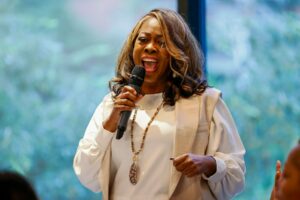New program aims to invest in Black women’s leadership in the South
Tameika Devine is a trailblazer with nearly 20 years in elected office: In 2002, she became the first Black woman to serve on the city council and first Black person to win an at-large election in Colombia, South Carolina, which she served in until 2021, when she ran for mayor. She narrowly lost.
But that was not the end of Devine’s public service. After her loss, she pledged that she would continue to do important work in the community, uplifting issues like affordable housing and mental health awareness.
“I’m a leader, and the leadership wasn’t afforded to me by the title — it’s by who I am,” Devine said.
Now, Devine is among the 25 women chosen to be a part of the inaugural class of the Power, Innovation and Leadership executive education program at the Center for Public Leadership at the Harvard Kennedy School. The training program was designed for people who are working to empower Black women and girls in the South and was conceived by LaTosha Brown, who is perhaps most well-known for being the cofounder of Black Voters Matter. A community organizer, political strategist and consultant, Brown has gained a national profile in recent years for the crucial role she played in organizing voter mobilization efforts in Deep South states including Alabama and Georgia.
Brown deeply believes that “if you change the world for a Black girl, you will literally change the world. When they’re in environments to flourish and thrive, then the whole society will be in an environment to flourish and thrive.” She handpicked the inaugural cohort based upon their demonstrated commitment to their communities, and especially Black women and girls.
The three-year hybrid program meets once a week and officially began this month. Among the participants are attorneys, formerly incarcerated women, reproductive justice advocates, social venture capitalists and those who are directly working to enact policy change. Brown was intentional about including women from diverse sectors because one of the main goals of the program is for Black women in the South to have expanded access not only to institutional knowledge, but to peers. It aims to allow the women to think more critically about power, innovation and leadership via scholars and one another.
Janelle Sanchez, a member of the inaugural cohort and recently minted president and CEO of the Atlanta Wealth Building Initiative, an organization that seeks to close the racial wealth gap in Atlanta, noted that “there are very few opportunities that combine academic rigor with moral commitment for transformative outcomes.” She believes that it’s crucial for women, especially Black women, to be in rooms where they are thinking about how to access and mobilize power.
“The network here is incredible. We’ve just started and already I’ve picked up the phone to call individual cohort members to get insight for real-time institutional decisions I need to make. The depth of context and recommendations they’ve been able to offer me has been invaluable,” Sanchez said.
Brown’s foundation, Truth Speaks Innovation, is fully funding the program at Harvard. She was motivated because Black women and girls, especially in the South, are often left out of philanthropy and professional development opportunities.
“Out of the 4.8 billion philanthropic dollars that come into the South, less than 1 percent go to Black women and girls,” she said.
As a cofounder of the Southern Black Girls and Women’s Consortium, a collective of Black women who work to fundraise and provide resources to underfunded organizations that are working to support Black women and girls in the South, Brown was working to help alleviate this gap in funding. Still, she realized that Black women are also underrepresented in leadership development opportunities. She has had five fellowships at Harvard since 2018 that she said have allowed her space to deepen her learning in an environment where she was not always expected to be the leader, and she wanted other Black women to have access to similar training opportunities. Brown believes that “as the South goes, so goes the nation.”
